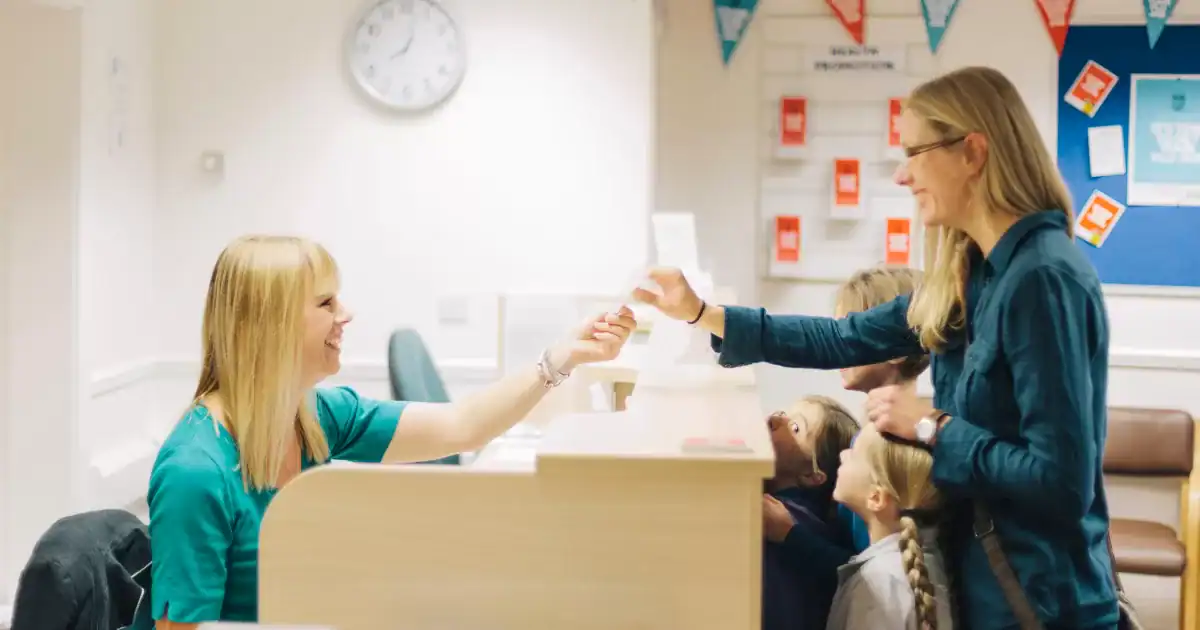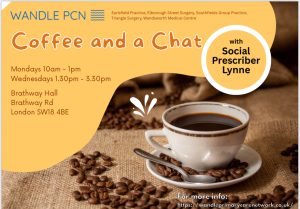NHS App Wandsworth Medical Centre | Online NHS Services & Appointments
Ready to Take Control of Your Health? Discover How the NHS App Wandsworth Medical Centre Gives You Instant NHS Access Today
Benefits of the App: Why Every Patient Should Use the NHS App Wandsworth Medical Centre?
Manage Appointments, Access Repeat Prescriptions, and View Test Results Online
Whether you want to book a GP appointment, request a repeat prescription, or view your recent test results, this intuitive app brings NHS services directly to your fingertips. This free app is available to patients aged 13 and above who are registered with a GP surgery and the NHS APP is accessible via smartphone, tablet, or desktop. The app connects directly to your GP records and enables you to:
- Order repeat prescriptions online and choose your preferred pharmacy for collection
- Book and manage GP appointments without needing to call the surgery
- Access your GP health record, including allergy and medication information, and if granted, more detailed medical data like test results
- Book and manage COVID-19 vaccinations
- Register your organ donation decision
- Choose how the NHS uses your data
- Use NHS 111 online to answer questions and receive guidance quickly
- Send secure messages to your GP surgery or a health professional
- Submit online forms and queries to your GP surgery
- Access healthcare services on behalf of someone you care for
- Manage hospital appointments and view referrals
- Access useful health links and resources shared by your doctor
Everything is securely managed through the NHS login, and if your device supports fingerprint or facial recognition, you can enjoy even easier access.
At Wandsworth Medical Centre, we’re proud to integrate modern technology to support our patients. We encourage all our patients to take advantage of this innovative tool and experience healthcare on your terms.
Managing User Notification Preferences within the NHS App
- Log in to the NHS App.
- Select the Account icon in the top corner.
- Select Settings.
- Select Manage notifications.
- Follow the link to your device settings.
What You’re Missing Without It: Not Using the NHS App Wandsworth Medical Centre? You Could Be Missing Quick Access to GP Services, Repeat Prescription Requests, and Important Test Result Links
Still haven’t downloaded the NHS App Wandsworth Medical Centre? You might be missing out on a quicker, smoother experience when it comes to managing your health. Without the app, patients may encounter delays when trying to book an appointment or order a prescription, especially during peak hours. The traditional way of calling the surgery or visiting in person can sometimes lead to unnecessary wait times.
Not only does the NHS App reduce these bottlenecks, but it also gives you immediate access to your health information. Imagine needing a copy of your test results or NHS number and having it ready within seconds, no calls needed. With this tool, patients can skip the hassle and take direct control of their healthcare journey.
Without the app, you might also miss out on:
- The ability to manage your healthcare appointments online
- Instant access to trusted NHS content and self-help guides
- Receiving timely responses from your GP practice via secure messaging
- Seamless tracking of prescription orders and pharmacy status
- Viewing hospital appointments and specialist referrals in one place
- Acting on organ donation and data sharing preferences from your mobile
Whether you’re a busy professional, a parent, or someone managing long-term conditions, the NHS App makes a real difference. It’s built to reduce stress, improve access, and help patients stay connected with their GP surgery no matter where they are.
Don’t let old systems slow you down; embrace the benefits that come with digital healthcare. It’s not just about saving time; it’s about improving the way you experience care.
Download the NHS App Wandsworth Medical Centre Today to Instantly Contact Your GP Surgery, Manage Appointments, and Request Prescriptions Without the Wait
We’re encouraging all patients of Wandsworth Medical Centre to download the NHS App today and start using it straight away. This is more than just another app; it’s your gateway to streamlined healthcare, offering quicker contact with your GP surgery and round-the-clock access to essential NHS services.
Using the app means:
- No more waiting on the phone to book an appointment
- No more guessing when your repeat prescription will be ready
- No more delays in receiving test results or important updates
The registration process is quick and secure. Once you’ve verified your identity, the app securely links to your health records held at Wandsworth Medical Centre. You’ll be able to manage your care effortlessly and with confidence, knowing your data is protected.
Our medical centre is committed to improving the patient experience, and the NHS App is a crucial part of this mission. It gives patients the power to manage their health independently, while still having the trusted support of their GP surgery.
To get started, simply visit the Google Play Store or Apple App Store and search for “NHS App.” You can also register and access the services through a web browser via the official NHS website.
Join thousands of other patients across London who are already benefiting from faster access, reduced waiting times, and improved health communication. Download the NHS App Wandsworth Medical Centre today and take the first step towards modern, efficient, and patient-centred healthcare.
Wandsworth Medical Centre is proud to serve the local community in London as a trusted family doctor. Let’s embrace digital health together, because when you have easy access, better care always follows.
Prostate Cancer Awareness | Support Prostate Cancer UK
Prostate Cancer Awareness: Why Early Detection Matters for Every Man – A Vital Message from Wandsworth Medical Centre
Recognising the Early Signs of Prostate Cancer: Symptoms Every Man Should Know About– Raising Awareness to Help Tackle This Common Cancer
Prostate cancer is the most common cancer in men in the UK, with 1 in 8 men being diagnosed in their lifetime. During Prostate Cancer Awareness, it is crucial to raise awareness about the symptoms, risk factors, and the importance of early diagnosis. At Wandsworth Medical Centre, we’re committed to helping men understand the signs and take early action to protect their health.
Prostate cancer often develops slowly and may not show symptoms in the early stages. However, recognising the warning signs can be life-saving. Symptoms may include:
- Increased need to urinate, especially at night
- Difficulty starting or stopping urination
- Weak flow or straining
- Feeling that the bladder hasn’t fully emptied
- Blood in urine or semen
These signs are not always caused by prostate cancer but should never be ignored. Men experiencing these symptoms are encouraged to consult their GP for further investigation. The earlier a diagnosis is made, the better the chances of successful treatment and management.
Raising awareness is not just about sharing facts – it’s about shifting the cultural stigma around men’s health. Encouraging open discussions and normalising prostate cancer checks can make a significant impact, especially among high-risk groups.
Men with a family history of prostate cancer or those of African-Caribbean heritage face a higher risk, with around 1 in 4 men affected in these communities. By understanding your personal risk and acting early, you can greatly improve outcomes. Use Prostate Cancer UK’s online risk checker to assess your individual risk and seek medical advice promptly.
Prevention and Treatment: How to Manage Prostate Cancer Risk – A Guide to Support, Information, and Community Awareness
Although there’s no guaranteed way to prevent prostate cancer, being proactive about your health can help reduce your risk. At Wandsworth Medical Centre, we promote a healthy lifestyle, regular check-ups, and open conversations about men’s health as the foundation for prevention.
Risk factors for prostate cancer include:
- Age (risk increases after 50)
- Family history of prostate cancer
- Ethnicity (higher risk in Black men)
- Obesity and poor diet
By maintaining a balanced diet, staying physically active, and reducing alcohol consumption, men can support their overall wellbeing. Regular health screenings and using Prostate Cancer UK’s risk checker can also help in early detection and treatment.
When prostate cancer is diagnosed, the stage and grade of the cancer determine the treatment options. In some cases, active surveillance may be recommended if the cancer is low-risk and not causing symptoms. Other treatments include:
Our healthcare professionals at Wandsworth Medical Centre provide personalised care and advice tailored to each patient’s needs. We understand that living with prostate cancer presents physical and emotional challenges. That’s why we emphasise support, information, and community-based care.
We work closely with specialists and support networks to ensure every patient receives the right care at every stage – whether it’s during diagnosis, treatment, or survivorship. For those already living with prostate cancer, our team offers compassionate advice, regular health checks, and referrals to local support groups and clinical services.
Raising awareness about treatment options and encouraging men to check their risk can lead to earlier diagnoses and better outcomes. The impact of proactive health management cannot be overstated. It’s not just about prolonging life – it’s about living well.
Take Charge of Your Health – Visit Wandsworth Medical Centre for Prostate Cancer Support and Risk Checks
At Wandsworth Medical Centre, we understand how important it is to take control of your health. Our commitment is to empower men with the tools and knowledge they need to protect themselves from this common cancer in men.
We provide:
- Free prostate cancer information leaflets
- Access to GP consultations
- Prostate-specific antigen (PSA) if indicated
- Follow-up care and referrals to specialists
Whether you’re concerned about symptoms, have a family history, or just want to check your risk, we’re here to help. We also offer guidance on managing prostate health and accessing community support networks that can ease the journey of diagnosis and treatment.
Don’t wait – early action is crucial. Let’s challenge the cultural stigma around men’s health and encourage open conversations. 1 in 8 men will be diagnosed with prostate cancer in their lifetime. If you are over 50, or fall into a higher-risk group, speak with one of our GPs today.
Visit Wandsworth Medical Centre and take a positive step towards your health. With the right information, support, and care, you can face prostate cancer with confidence and resilience.
The Pharmacy First Service
The Pharmacy First Service
Your local pharmacy can give you advice on a range of conditions and offer treatment including prescription medicine for some conditions, without you needing to see a GP.
The conditions they can treat are:
- earache (aged 1 to 17 years)
- impetigo (aged 1 year and over) – a contagious skin infection
- infected insect bites (aged 1 year and over)
- shingles (aged 18 years and over) – infection that causes a painful rash
- sinusitis (aged 12 years and over) – infection of the sinuses
- sore throat (aged 5 years and over)
- urinary tract infections (UTIs) (women aged 16 to 64 years)
The pharmacist will offer you advice, treatment or refer you to a GP or another healthcare professional if needed. Pharmacies will update your GP health record.
If you are not within these age ranges, a pharmacist can still offer advice, but you may need to see a GP for treatment.
For an on-online consultation, please use the link: https://bit.ly/Mylocalpharmacy
For a self-referral, please use the link: Pharmacy First Self-Referral
For an emergency supply of your repeat prescription medicine, please call NHS 111 Emergency Prescription at https://111.nhs.uk/emergency-prescription
Find a local Pharmacy: https://www.nhs.uk/service-search/pharmacy/find-a-pharmacy
Hay Fever Relief South West London | Hay fever Treatment
Looking for Hay Fever Relief in South West London? Discover Expert Tips, Allergy Prevention & Hay fever Treatments for the Entire Season
What is Hay Fever?
Understanding hay fever, common allergies, and how pollen exposure triggers symptoms during the peak of the pollen season.
Hay fever, also known as seasonal allergic rhinitis, is a common allergic reaction to allergens such as grasses and tree, or other pollens. It typically affects people in the spring and summer months. These months are known as the hay fever season, which usually starts in late March and can persist throughout the entire summer. Many individuals experience symptoms like sneezing, runny nose, nasal congestion, and itchy or irritated eyes. These are classic hay fever symptoms, and while they may seem minor, they can greatly impact daily life.
Hay fever occurs when the body’s immune system overreacts to allergens. This leads to nose, eye, throat, and sinuses inflammation. People who suffer from hay fever often experience symptoms persistently each year, especially when pollen counts are high. It’s important to understand that hay fever is more than just a nuisance—it can lead to severe discomfort and even interfere with breathing in more severe cases.
Common Symptoms & Triggers
Identify typical hay fever symptoms, allergy responses, and pollen’s impact during severe hay fever cases in South West London.
The most common symptoms of hay fever include sneezing, runny nose, itchy eyes, nasal congestion, and sometimes even abdominal pain or breathing difficulties in severe cases. These symptoms of severe allergic reactions are usually triggered by pollen, dust mites, and other environmental allergens.
People who suffer from hay fever often report increased symptoms during high pollen count days. Tree pollen and grass pollen are among the most common triggers in the UK. Hay fever can also be aggravated by weather changes, pollution, and other allergens.
Severe hay fever symptoms may require medical attention and a tailored course of
treatment. Consulting a GP at Wandsworth Medical Centre if you have severe symptoms can help identify the specific allergens and provide effective treatment options.

How to Manage Hay Fever Naturally
Explore natural hay fever treatment options alongside hay fever treatment alternatives and non-invasive allergy management tips.
There are many ways to prevent and treat hay fever. Please click on this link for NHS advice for Hay fever.
You can prevent hay fever symptoms by limiting exposure to allergens, keeping windows closed during peak pollen hours and using air purifiers can help suppress exposure to allergens indoors. Monitoring the pollen count regularly allows sufferers to plan their outdoor activities more effectively.
There are also several natural remedies to alleviate hay fever symptoms. Herbal remedies and saline rinses are also helpful for cleansing nasal passages.
Many individuals also benefit from using over-the-counter nasal and eye drops that reduce inflammation and help ease irritation. A pharmacist can help with hay fever, and hay fever treatments are available to buy without a prescription. Using nasal sprays, eye drops, and non-drowsy antihistamine tablets can provide relief from symptoms.
It’s important to note that while these methods can offer temporary relief, they might not work for everyone. For severe symptoms, book an appointment at Wandsworth Medical Centre, your trusted GP practice in London Wandsworth Medical Centre.
When to Seek Medical Advice
Know when to seek help for severe hay fever symptoms
If your symptoms persist despite using over-the-counter remedies or natural methods, it’s time to seek medical advice. Treatment for hay fever varies depending on the severity of symptoms and individual medical history.

How Wandsworth Medical Centre Can Help
At Wandsworth Medical Centre, we offer a variety of treatments in London tailored to meet individual needs. Our GP practice provides expert care and consultation to patients suffering from seasonal allergic rhinitis. Whether you’re dealing with mild irritation or severe hay fever symptoms, our healthcare professionals are here to help.
Conclusion: If you suffer from hay fever, don’t let the hay fever season hold you back.
Be proactive—monitor the pollen count, take preventive steps, and explore treatments available to ensure you stay comfortable throughout spring and summer. If symptoms worsen or persist, don’t hesitate to seek help. Get in touch with Wandsworth Medical Centre today and find the relief from the symptoms of hay fever you deserve.
For more frequently asked questions, expert advice, and resources on hay fever relief in South West London, visit wandsworthmedicalcentre.co.uk or call us to book your consultation today.
Breast Cancer Screening UK | NHS Breast Screening – Help You Decide
Breast Cancer Screening UK: How NHS Breast Screening and Mammograms Help You Decide and Ensure Early Detection
The Benefits of Breast Cancer Screening UK – Early Detection Saves Lives
Discover how Breast Cancer Screening UK helps detect cancer early, improving treatment outcomes. Learn about the benefits of mammograms, the role of your local breast screening unit, and why attending your NHS breast screening appointment is vital.
Breast cancer screening is a vital health service that helps detect breast cancer at an early stage, often before symptoms appear. The NHS Breast Screening Programme invites women between the ages of 50 and 70 to attend a breast screening every 3 years. Screening can identify cancers that are too small to see or feel, improving treatment outcomes and saving lives.
How Breast Cancer Screening Works
Breast screening uses X-ray imaging, known as a mammogram, to detect abnormal breast tissue changes. A mammogram looks abnormal when it picks up signs of cancer, prompting further tests. Women diagnosed with breast cancer at an early stage often have more treatment options and a better prognosis.
The NHS England recommends mammograms every 3 years for women over 50. Those assigned female at birth should check their eligibility for screening through their local breast screening unit. If you have concerns about your breast health, you can ask for an appointment at your local screening unit or call your local breast screening service for guidance.
The Benefits of Regular Breast Screening
-
Early Detection Saves Lives
Breast cancer screening can detect cancers at an early stage, often before symptoms develop. Early diagnosis and treatment significantly improve the survival rate. Each year in the UK, screening helps detect thousands of cases that might otherwise go unnoticed. -
Identifying Cancer Before Symptoms Appear
Screening can detect cancers that would never be found through a breast examination alone. Many women diagnosed through screening have cancers that are too small to be felt manually. The screening process can also pick up breast changes that may develop into cancer if left untreated. -
Reduced Mortality from Breast Cancer
Studies show that breast screening saves approximately 1,300 lives from breast cancer in the UK each year. For every 100 women screened, a small number will be found to have cancer. Early diagnosis significantly reduces deaths by enabling timely and effective treatment. -
Regular Screening for Long-Term Protection
Women are typically screened every 3 years for 20 years, ensuring continued monitoring. If you are invited for breast screening, attending your appointment is crucial for ongoing breast health.
What Happens If You Are Called Back for More Tests?
After a mammogram, some women may be called back for more tests. This doesn’t always mean cancer is present; sometimes, an abnormal mammogram may be due to benign breast tissue changes. If necessary, further tests can determine whether a breast cancer diagnosis is needed.
Women asked to return may undergo additional imaging or a biopsy. Some cases involve ductal carcinoma in situ (DCIS), a non-invasive cancer that may or may not develop further. Early intervention can prevent serious complications.
What Happens If You Don’t Attend Breast Screening?
Neglecting to attend your breast screening every 3 years increases the risk of breast cancer going undetected. Women who skip screening are at greater risk of being diagnosed with breast cancer at a more advanced stage, limiting treatment options.
Not attending screening means missing the chance to detect breast cancer at the earliest stage. Delaying screening can lead to later diagnoses when treatment is more complex. Missing an appointment can also result in cancers progressing to a stage where they are more difficult to treat.
Understanding the Benefits and Risks of Breast Screening
While breast screening uses advanced imaging techniques, there are risks to consider. Screening may detect cancer that would never cause symptoms or harm, known as overdiagnosis. However, the benefits outweigh the risks. By finding cancers early, screening ensures timely treatment and improved outcomes. The NHS provides additional support for women who need help with accessibility or understanding the process.
The Risks of Skipping Breast Cancer Screening UK – What You Need to Know
Not attending your breast cancer screening UK appointment can delay diagnosis, leading to severe consequences. Learn about the symptoms of breast cancer, the risks of breast screening, and why missing your local breast screening can impact your health.
Breast cancer screening is a crucial part of early detection, and missing your appointment can delay a diagnosis that could save your life. Women are invited to attend breast cancer screening every three years between the ages of 50 and 70. However, some may choose not to attend or feel uncertain about the process. It’s essential to understand the potential risks of skipping this vital procedure and how it could impact your health.
A mammogram is the primary test used during breast cancer screening. It’s a low-dose X-ray that helps detect abnormal changes in the breast tissue, even before symptoms appear. These changes may not always indicate cancer, but they can point to issues that require further investigation. If problems are detected, additional tests, such as another mammogram or ultrasound, may be necessary.
By skipping your breast screening appointment, you could be delaying the detection of breast cancer. Early diagnosis is vital for successful treatment. Cancer grows over time, and the sooner the disease is caught, the better the chances of successful treatment and recovery.
A mammogram is still the most effective way to detect breast cancer before it becomes detectable by other means. It can often detect cancer when it is too small to be felt or seen. However, the mammogram may sometimes miss a cancerous lump, and additional tests may be required for further confirmation. This is why attending regular screenings is essential, even after the age of 70, if invited.
For those who may feel anxious or fearful about breast screening, it’s important to know that the screening service offers support and guidance. If you need assistance, you can contact the breast screening service for help. They will explain what happens during the procedure and ensure you feel comfortable and informed. If you are unable to attend, you will receive a letter inviting you to rebook. Don’t hesitate to reach out for help—your health is the top priority.
Take Control of Your Health Today with NHS Breast Cancer Screening UK at Wandsworth Medical Centre
If you’ve been invited for breast screening, it’s essential to schedule your appointment with your local breast screening service. The NHS Breast Screening Programme plays a vital role in reducing deaths from breast cancer by offering regular mammograms after screening. These tests help pick up breast cancer that would never otherwise have been seen, giving women diagnosed with breast cancer the opportunity to be treated for breast cancer early.
Once you reach the age of 50, you will receive a letter inviting you to attend breast screening every 3 years. If you haven’t received your invitation, you can call your local breast screening service to ask about your eligibility. Women with breast cancer who attend screening are often diagnosed and treated for breast cancer at a much earlier stage, improving survival rates.
After your screening, you will get your results within two weeks. If the mammogram shows any abnormalities, you may be asked to come back for more tests. This doesn’t necessarily mean you have breast cancer, as some breast problems rarely cause cancer. However, early detection of signs of breast cancer is crucial to prevent you from getting breast cancer at a later stage, which may be harder to treat.
For those who need additional support to attend screening or would like to understand what will happen during the process, the NHS provides guidance. Don’t worry if you need help – healthcare professionals are available to explain what will happen during your screening and to support you in attending your appointment.
Remember, if you continue to have breast screening every 3 years, you’re taking a proactive step in finding breast cancers early and receiving treatment sooner. Whether you’re diagnosed with breast cancer or not, attending your screening regularly can help ensure better health outcomes. Don’t wait, book your screening appointment today, and get your results early with the support of Wandsworth Medical Centre. Your health is your priority, and early screening saves lives.
Vitamin D Supplementation UK: Essential Guide to Vitamin D Deficiency and NHS Recommendations
Vitamin D Supplementation UK: Why You Need to Take Vitamin D to Prevent Deficiency | Wandsworth Medical Centre
The History and Importance of Vitamin D Supplementation UK: Understanding the Role of Vitamin D in Maintaining Optimal Health
Vitamin D is vital for regulating calcium and phosphate levels, which are essential for healthy bones, teeth, and muscles. Historically, humans obtained vitamin D from sunlight, but limited exposure—especially in the UK during the autumn and winter months—has made supplementation essential.
Vitamin D and Its Role in Health
Vitamin D, known as the “sunshine vitamin,” is crucial for calcium absorption and bone health. A lack of vitamin D can lead to rickets in children, causing bone deformities, and osteomalacia in adults, resulting in bone pain and muscle weakness. In the UK, from October to March, the government advises everyone, including pregnant and breastfeeding women, to take a daily supplement containing 10 micrograms of vitamin D.
Vitamin D Deficiency and the Importance of Supplementation
Vitamin D deficiency is common due to limited sunlight exposure, particularly for those with darker skin, such as individuals of African-Caribbean or South Asian descent. These groups are encouraged to take supplements year-round.
The NHS recommends that children aged 1 year and older, adults, and pregnant women take 10 micrograms of vitamin D daily. Breastfed babies, especially those not receiving adequate fortified infant formula, should take 8.5 to 10 micrograms of vitamin D daily to support healthy bone development.
Sources of Vitamin D and Supplementation Needs
While sunlight is the primary source of vitamin D, it can be difficult to get enough from sunlight alone in the UK, especially during the winter. Foods rich in vitamin D, such as oily fish, red meat, egg yolks, and fortified foods like breakfast cereals, can help, but often not enough to meet the required levels. Therefore, supplementation is necessary for many individuals.
For those needing extra vitamin D, supplements containing 10 micrograms or 8.5 to 10 micrograms are widely available in pharmacies and supermarkets. Vitamin D drops are also suitable for infants, ensuring even young children get their required intake.
Health Risks of Vitamin D Deficiency
Without adequate vitamin D, the body cannot properly regulate calcium, weakening bones and increasing the risk of fractures. In children, deficiency can cause rickets, while adults may experience osteomalacia. Prolonged deficiency can lead to hypercalcaemia, where excessive calcium builds up in the blood, potentially causing kidney damage.
Regular monitoring of vitamin D levels and ensuring proper intake through supplements, food, and sunlight exposure can help prevent these issues. During the autumn and winter months, taking a daily supplement is essential to maintain healthy vitamin D levels and reduce the risk of bone-related diseases.
Why Do You Need to Take Vitamin D?
Vitamin D is essential for supporting overall health, particularly in maintaining healthy bones, teeth, and muscles. Vitamin D helps the body absorb calcium and phosphate, which are crucial for bone health. In the past, humans obtained sufficient vitamin D from exposure to sunlight, as the skin naturally produces vitamin D when exposed to the sun. However, due to factors such as geographic location, lifestyle, and weather conditions, people in the UK—especially during the autumn and winter months—may struggle to get enough vitamin D from sunlight alone. This has increased the need for vitamin D supplementation throughout the year.
While sunlight remains the primary source of vitamin D, it often does not meet the body’s needs in the UK, particularly in winter. Vitamin D supplementation during these months is essential to ensure your body receives the required 10 micrograms per day, as recommended by government dietary guidelines and the NHS.
Vitamin D deficiency can lead to weakened bones and muscles, increasing the risk of fractures and other health complications. In children, vitamin D deficiency can cause rickets, a condition that results in softening and deformities of the bones. Adults with insufficient vitamin D may experience osteomalacia, which causes bone pain and muscle weakness. Without enough vitamin D, the body cannot regulate calcium properly, which can weaken bones and damage the kidneys over time.
To avoid these issues, it is crucial to take vitamin D supplements throughout the year, particularly when sunlight exposure is limited, to ensure your body has the necessary vitamin D for optimal function.
How to Safely Take Vitamin D Supplement
To safely take vitamin D supplements, follow the recommended dosage. A daily supplement containing 10 micrograms of vitamin D is generally adequate for most people, although specific health conditions may require different amounts. Supplementing throughout the year—not just during autumn and winter—helps build up vitamin D in the body and ensures sufficient levels year-round.
Does Vitamin D Cause Too Much Calcium?
There is no need to worry about excessive calcium from taking vitamin D supplements in the recommended amounts. Vitamin D helps regulate calcium, ensuring it is absorbed properly for bone health. However, excessive vitamin D intake can cause too much calcium to build up in the blood, which can be harmful. For this reason, it is important to take vitamin D in the recommended dosages.
Vitamin D and Pregnancy
For pregnant women, adequate vitamin D intake is essential to prevent complications such as bone issues and to support bone health for both mother and baby. The NHS recommends that pregnant women take a daily supplement containing 10 micrograms of vitamin D.

The Benefits of Taking Vitamin D and What You Lose Without Adequate Vitamin D Levels: Why You Need to Take a Vitamin D Supplement
Vitamin D plays a crucial role in maintaining strong bones, teeth, and muscles by regulating calcium and phosphate levels in the body. Unfortunately, many people struggle to get enough vitamin D, especially during the winter when sunlight exposure is limited. This is why taking a daily vitamin D supplement is important, particularly during the colder months.
A daily supplement ensures you maintain optimal vitamin D levels throughout the year. The body produces vitamin D from sunlight, but in the UK, sunlight is often insufficient, particularly in winter. A daily supplement containing 8.5 to 10 micrograms of vitamin D can help keep your levels within the recommended range.
Without adequate vitamin D, serious health risks arise. Deficiency can cause softening of the bones, muscle pain, and weakness. Conditions like rickets in children or osteomalacia in adults are linked to insufficient vitamin D. Pregnant women with low vitamin D may also face complications, such as bone issues and an increased risk of fractures.
Certain groups, such as people with dark skin, are more prone to deficiency because their skin produces less vitamin D. Infants under 1 year, especially those not getting fortified formula, should also receive vitamin D supplements. The NHS advises that babies who receive 500ml of fortified infant formula daily should be well-supported for their vitamin D needs.
For children aged 1 year and older, a daily vitamin D supplement is vital, particularly for those with limited sunshine exposure.
Though some foods are fortified with vitamin D, they are often not enough to meet daily requirements. Therefore, supplementing with vitamin D, especially during winter, ensures proper bone health, immune support, and overall wellness.

Get Enough Vitamin D Today: Visit Wandsworth Medical Centre to Learn More About the Best Vitamin D Supplement for Your Health Needs
Vitamin D is essential for overall health, supporting your immune system, bones, and calcium regulation. Sunlight exposure helps the body make vitamin D, but during the winter months, many people, especially in the UK, don’t get enough. A daily vitamin D supplement is crucial during these months.
The government recommends 10 micrograms of vitamin D per day. Factors like age, skin tone, and lifestyle may affect how much you need, with individuals who spend little time outdoors or have darker skin being more likely to need supplements.
At Wandsworth Medical Centre, our expert team can help you determine the best vitamin D supplement for your needs. We provide guidance on maintaining adequate levels of vitamin D throughout the year, ensuring you stay healthy. Visit us today to learn more about vitamin D supplementation!
Healthy Eating for Weight Loss | Tips to Lose Weight with Healthy Diet
Healthy Eating for Weight Loss: Expert Tips from Wandsworth Medical Centre to Help You Lose Excess Weight and Achieve a Healthy Diet
The Benefits of Healthy Eating for Weight Loss and Managing a Healthy Weight
Discover how embracing a balanced diet with whole grains and nutrient-rich foods can support weight-loss goals, improve weight management, and reduce the risk of Type 2 diabetes.
When trying to lose weight, a healthy eating plan can make a big difference. Eating a balanced diet, rich in nutrient-dense foods, is a great way to get on the right track toward achieving your weight-loss goals and improving your overall health. By focusing on foods like whole grains, fruits, vegetables, and lean proteins, you can create healthier eating habits that support long-term weight loss and better health.
What Does a Healthy Diet Look Like?
A healthy diet is one that is low in calories but high in essential nutrients like fibre and healthy fats. Foods high in fibre, such as fruits, vegetables, and whole grains, help you feel full longer, making it easier to eat less and avoid overeating. Additionally, healthy fats, found in foods like avocados, nuts, and olive oil, provide energy and are essential for heart health.
For those trying to lose weight, it’s a good idea to be mindful of portion sizes and opt for foods low in calories and high in nutrition. Avoid foods and drinks with added sugar, processed carbohydrates like white bread, and items high in calories with little nutritional value. Instead, focus on plant-based options and natural sugars in fruits, which can help you maintain a healthy weight.
The Impact of Healthy Eating on Weight Management
A healthy eating plan combined with regular physical activity is one of the most effective ways to lose weight and keep it off. Obesity and being overweight are often associated with health conditions like heart disease and Type 2 diabetes. However, adopting healthier eating habits can significantly reduce these risks. By eating delicious, nutrient-rich meals, you can manage your weight and improve your overall health and wellbeing.
Studies show that starting a diet and exercise routine that focuses on balanced, portion-controlled meals can help you lose 1 to 2 pounds per week. This is considered a safe and sustainable way to lose weight. A weight management program tailored to your needs can provide support, whether you want to lose weight or maintain a healthy weight.
Practical Tips for a Healthy Lifestyle
- Plan Balanced Meals
Aim for every meal to include a mix of lean protein, healthy fats, and carbohydrates from whole grains or plant-based sources. For example, a delicious healthy keto diet could include avocado, eggs, and spinach cooked with olive oil. - Mind Portion Sizes
Use smaller plates to help you stick to appropriate portion sizes. This prevents overeating and helps control daily calorie intake. - Snack Smartly
Replace high-calorie snacks with healthy snack options like fresh fruit, unsalted nuts, or low-fat yoghurt. These choices are lower in calories and high in essential nutrients. - Stay Hydrated
Drinking water throughout the day can help you avoid mistaking thirst for hunger, a common cause of eating too much. - Reduce Processed Foods
Cut back on foods like white bread and other refined carbohydrates. These can spike blood sugar levels and leave you feeling hungry soon after eating. - Incorporate Physical Activity
Diet and physical activity go hand in hand. Regular exercise not only burns calories but also supports heart health and helps improve overall fitness levels.
Overcoming Challenges
Trying to lose weight without eating a balanced diet can be difficult and may lead to eating patterns that don’t support your goals. It’s important to seek advice from a healthcare professional or nutritionist to create a dietary plan that meets your specific requirements, particularly if you have underlying health conditions or are recovering from eating disorders.
If you’re struggling to stick to a healthy diet, consider joining a weight management program. These programs can offer tailored advice, meal plans, and support to help you stay on track. Tools like the free NHS Weight Loss Plan can also provide practical tips to start losing weight and develop healthy new habits.
Why Healthy Eating Matters
Healthy eating is more than a strategy for weight loss; it is a foundation for lifelong wellbeing. Choosing nutrient-rich foods over high-calorie, low-nutrient options helps you maintain energy, support your immune system, and reduce the risk of conditions like heart disease and Type 2 diabetes. Every small change—such as swapping sugary snacks for fresh fruit or opting for whole grains—contributes to better health.
Neglecting a balanced diet, however, can lead to health issues like obesity, blood sugar imbalances, and poor energy levels. For individuals with specific needs, such as managing prediabetes or following a tailored diet plan, the stakes are even higher. Healthy changes can help you achieve steady progress, such as losing 0.5 to 1 kilogram per week, while promoting long-term success.
The Risks of Skipping Healthy Eating: How It Affects Weight Loss and Overall Health
The Link Between Skipping Healthy Eating and Weight Loss Challenges
When you’re trying to lose weight, consuming fewer calories is an essential first step. However, the quality of those calories matters just as much as the quantity. A diet plan rich in nutrient-dense foods like fruits, vegetables, lean proteins, and whole grains helps your body function efficiently and supports healthy weight loss.
Failing to prioritise healthy eating often leads to consuming foods high in calories and low in nutritional value. This imbalance can result in weight gain or make it difficult to shed extra pounds. Additionally, an unhealthy diet can leave you feeling sluggish, making it harder to engage in physical activity—a key component of successful weight management.
Health Risks Associated with Poor Dietary Choices
Skipping healthy eating is associated with weight-related health issues, including obesity, heart disease, and Type 2 diabetes. Poor eating habits can also lead to fluctuations in blood sugar levels, low energy, and difficulty concentrating. These issues don’t just affect your ability to lose weight; they can significantly impact your overall wellbeing.
For those with specific dietary requirements or health conditions, such as being a Mayo Clinic patient or managing prediabetes, poor nutrition can exacerbate health problems. Without a dietary approach tailored to your needs, the path to optimal health becomes even more challenging.
The Role of Healthy Changes in Long-Term Success
Healthy weight loss is not about quick fixes—it’s about making sustainable, healthy changes that fit your lifestyle. Simple steps like choosing smaller portion sizes, replacing sugary snacks with fruits, and incorporating lean proteins into every meal can make a significant difference.
When you adopt a diet plan that aligns with your goals, you’re more likely to see steady progress, losing 0.5 to 1 kilogram per week in a healthy way. This approach is safer and more sustainable than crash diets, which often fail to deliver lasting results.
Practical Tips for Better Eating Habits
- Prioritise Nutrition: Focus on nutrient-rich foods to meet your dietary requirements and support your energy levels.
- Plan Meals: A structured eating plan helps you make mindful food choices and reduces the likelihood of overeating.
- Seek Support: Sharing your goals with someone you care about can provide encouragement and accountability.
Start Your Healthy Eating Journey Today with Wandsworth Medical Centre

Download the free NHS Weight Loss Plan and explore the best diet for weight loss, healthy eating tips, and effective strategies for losing excess weight. Visit our website now to achieve your goals!
Healthy eating is a cornerstone of weight management and overall wellbeing. Whether you’re trying to lose excess weight or maintain a healthy weight, making smart food choices can set you up for success. With support from healthcare professionals and tools like the NHS Weight Loss Plan, you can embark on a weight-loss journey that’s both healthy and sustainable. Remember, every small step you take today can lead to big improvements in your health tomorrow.
At Wandsworth Medical Centre, we are here to support you on your journey to better health.
Ready to take the next step? Contact us today to learn more about how staying fit and healthy can transform your well-being.
Stay Fit and Healthy with Expert Tips from Wandsworth Medical Centre – Stay Fit, Stay Healthy
How Can You Stay Fit and Stay Healthy as You Get Older? Ways to Stay Fit and Expert Tips for Staying Healthy by Wandsworth Medical Centre
Introduction: Why It’s Essential to Stay Fit and Healthy as You Get Older
Learn how physical activity and healthy eating can help you stay fit and healthy as you age.
Staying fit and healthy as you age is one of the most effective ways to thrive throughout your life. Whether you’re in your 30s, 40s, or beyond, adopting a physically active lifestyle can help you maintain your independence, improve your health, and reduce the risk of chronic diseases. A healthy lifestyle, which incorporates regular exercise and healthy eating, not only enhances your cardiovascular health but also helps manage stress, boost your mood, and prevent conditions like type 2 diabetes and hypertension. By making healthy choices and committing to at least 150 minutes of physical activity a week, you’re setting yourself up for a healthier, happier future.
The Benefits of Staying Fit and Healthy: Manage Stress and Boost Your Body and Mind
Discover how regular exercise, managing stress, and eating well can improve your overall well-being.
Physical Activity: The Key to Better Health
Physical activity is a crucial aspect of staying fit and healthy, especially as you get older. The NHS recommends adults get at least 150 minutes of moderate-intensity physical activity each week. This can be achieved through a variety of activities, such as brisk walking, cycling, or aerobic exercises. The benefits of staying active are vast, with improvements in cardiovascular health, a stronger immune system, better mood, and reduced risk of developing chronic conditions like type 2 diabetes, heart disease, and even some cancers. Even small amounts of activity can have significant health benefits, and the more you do, the greater the impact.
By staying physically active, you also reduce your risk of developing conditions such as cardiovascular disease, arthritis, and obesity. Engaging in regular exercise helps maintain a healthy weight, improve muscle strength, and boost your overall energy levels. As you age, it becomes even more critical to stay active, as it can help reduce the effects of aging on your body, improve your balance and mobility, and ensure you continue to enjoy a full and active life.
Healthy Eating: Fueling Your Body for Success
Alongside regular physical activity, eating healthy is one of the most effective ways to stay fit and healthy as you age. The food you consume plays a vital role in your overall health, providing the nutrients your body needs to function properly. Healthy eating supports your immune system, boosts energy levels, and helps maintain a healthy weight.
When aiming to stay healthy, it’s essential to focus on consuming a balanced diet, which includes plenty of fruits, vegetables, lean proteins, and whole grains. Avoiding processed foods, which are often high in sugar, salt, and unhealthy fats, is key to managing your weight and reducing your risk of developing chronic health conditions like hypertension and type 2 diabetes.
Preparing healthy meals at home is a great way to control what you’re eating. You can make better choices by selecting fresh ingredients, limiting added sugars, and controlling portion sizes. A healthy diet not only helps you lose weight and keep it off but also gives you the nutrients your body needs to perform at its best. Remember, making healthy choices doesn’t have to be complicated. Simple swaps like choosing water over sugary drinks, or cooking a homemade meal rather than opting for takeout, can have a significant impact on your overall health.
The Importance of Consistency and Routine
One of the best ways to stay fit and healthy is by establishing a routine that includes regular physical activity and healthy eating. The more consistently you incorporate these healthy habits into your daily life, the easier it becomes to maintain them. Building a routine helps you make exercise and healthy eating part of your everyday life, making it much easier to stay on track.
Try to set aside specific times in your day for exercise, whether it’s a brisk walk at lunch, a cycle to work, or an evening workout session. You can also make simple changes to your daily routine, such as parking further away from your destination to get extra steps or taking the stairs instead of the lift. These small adjustments can add up over time, helping you meet your weekly activity goals.
Tracking your progress can also keep you motivated. Use a fitness tracker or an app to monitor your steps, active minutes, or calories burned. Setting daily or weekly goals and celebrating when you reach them will help you stay engaged and excited about your health journey.
What Happens to Your Body Without Physical Activity? The Importance of Getting Active, Make It a Habit!
Find out how a lack of physical activity affects your health and why staying fit is essential for your longevity.
If you don’t exercise regularly, your body will start to experience several negative effects. Physical inactivity can lead to weight gain, muscle weakness, and a higher risk of developing chronic conditions like type 2 diabetes, heart disease, and certain cancers. It can also impact your mental health, increasing the risk of depression, anxiety, and stress.
Without regular physical activity, your cardiovascular system becomes weaker, your muscles lose strength, and your bones may become brittle. Additionally, staying inactive can lead to poor circulation, joint stiffness, and an overall decrease in energy levels. It’s important to understand that staying active isn’t just about preventing disease – it’s also about feeling good and improving your quality of life. Exercise releases endorphins, the “feel-good” hormones, which can help boost your mood, reduce stress and anxiety, and improve sleep quality.
Get Moving and Stay Fit and Healthy with Wandsworth Medical Centre
Take the first step to a healthier lifestyle with expert tips and support from the NHS. Make it a habit to stay fit and healthy!
Tips for Staying Healthy
- Set Realistic Goals: Start with small, achievable goals, and gradually increase your activity levels over time. For example, aim for 10-minute sessions of walking or light aerobic exercise and build from there. The more active you become, the more benefits you’ll experience.
- Find Activities You Enjoy: Whether it’s walking, cycling, swimming, or dancing, engaging in activities you enjoy will make it easier to stick with your routine. The more fun the activity, the more likely you are to continue it in the long term.
- Incorporate Strength Training: Building muscle through strength exercises like resistance training or Pilates helps maintain bone density, boosts metabolism, and improves overall strength. Aim to include strength exercises at least twice a week.
- Stay Social: Exercising with friends or joining a local fitness group can keep you motivated and add a social element to your fitness routine. It’s also a great way to meet new people who share similar goals.
- Be Consistent: Consistency is key to maintaining a healthy lifestyle. Set aside time each day for physical activity, even if it’s just a brisk walk after dinner. It’s also important to make healthy food choices consistently, as the long-term impact of your habits will result in better health.

Final Thoughts: Staying Fit and Healthy Throughout Your Life
Staying fit and healthy is essential for thriving as you age. By incorporating regular physical activity and healthy eating habits into your daily routine, you can significantly improve your cardiovascular health, manage stress, and lower your risk of developing chronic conditions like type 2 diabetes and heart disease. Whether you’re walking, cycling, or simply choosing healthier foods, every positive choice you make brings you closer to a healthier, longer life.
Remember, getting active doesn’t have to be overwhelming or time-consuming. Start with small, manageable goals and gradually increase your activity levels over time. Staying active and eating healthy is a journey, but with the right mindset and consistent effort, you can experience better health, improved mood, and a higher quality of life.
As you get older, it’s important to stay physically active and make healthier choices to maintain your independence and vitality. Whether it’s through brisk walks, cycling, or preparing healthy meals, every step counts. With the right habits, you’ll be able to maintain a healthy weight, reduce your risk of chronic disease, and enjoy a vibrant life well into your later years.
If you’re unsure about where to start or need guidance on how to get fit and stay healthy, don’t hesitate to consult a healthcare professional. The Department of Health recommends getting at least 150 minutes of moderate physical activity a week to achieve optimal health. So, make the decision today – take steps to stay active, make healthier choices, and thrive throughout your life!
The health benefits of staying fit and healthy are far-reaching, positively impacting many aspects of your life. From improved mental well-being to a reduced risk of chronic conditions, staying active and making healthy choices is a step towards a brighter, healthier future. At Wandsworth Medical Centre, we are here to support you on your journey to better health.
Ready to take the next step? Contact us today to learn more about how staying fit and healthy can transform your well-being.
Quit Smoking Support: Effective Stop Smoking Services and NHS Resources to Help You Quit
Looking for Effective Quit Smoking Support? Discover How NHS Stop Smoking Services, Quit Plans, and Nicotine Replacement Therapy Can Help You Manage Cravings, Overcome Withdrawal Symptoms, and Stay Smokefree with Vaping Options!
How Quit Smoking Support from NHS Can Help You Create a Personal Quit Plan with Nicotine Replacement Therapy (NRT) and Vaping Options to Manage Cravings and Overcome Withdrawal Symptoms Effectively!
When it comes to quitting smoking, Quit Smoking Support from the NHS is an invaluable resource designed to help you quit for good. With a local stop-smoking service, you can access various free NHS options tailored to your needs. Research shows that smokers who seek help are three times more likely to quit successfully, so taking the first step toward a smoke-free life is crucial.
Creating a personal quit plan is an essential part of your journey. The NHS provides various ways to quit, including Nicotine Replacement Therapy (NRT), which may include products like nicotine patches, gum, and long-acting inhalers. These options are safe to use and can significantly reduce cravings and withdrawal symptoms, making it easier to manage the urge to smoke. For those considering alternatives to traditional smoking, e-cigarettes and vapes are considered less harmful than smoking and may be offered as part of your cessation strategy.
In addition to these options, the NHS Quit Smoking App is a fantastic tool available to help you stay on track. This app provides daily support, tips, and reminders to boost your chances of quitting. For those needing immediate advice and support, a helpline is available on 0300 123 1044. The trained advisers on this helpline can guide you through the quitting process and discuss the types of stop-smoking medicines available to help.
It’s important to understand that quitting smoking is never too late. Whether you’re trying to deal with the physical and mental health challenges of quitting or looking for strategies to deal with stress without turning to tobacco, support is available to help you stop. Smokers who want to quit can access a wealth of resources, including specialist help from your GP or local pharmacist, who can provide tailored advice based on your needs.
Remember, by making use of these free stop-smoking services, you not only enhance your chances of quitting for good but also improve your overall health, reduce the risk of secondhand smoke exposure for your loved ones, and lead a healthier lifestyle. Take that step today and make a plan to quit—your future self will thank you!

Exploring Effective Ways to Quit Smoking: The Benefits of Free NHS Stop Smoking Services, E-Cigarettes, and Vapes in Your Journey to Becoming Smoke-Free This Stoptober!
Quitting smoking can be a challenging journey, but with the right support, you’re more likely to succeed. Quit Smoking Support is essential for those looking to break free from tobacco smoking. The NHS offers free stop-smoking services that provide a range of options to help you stop. Whether you want to stop smoking entirely or are trying to quit, these services can offer the right support you need.
Helplines, such as the helpline on 0300 123 1044, can provide guidance and assistance. They can help you develop a personalized plan to quit and connect you with local resources. Research shows that people who use quit smoking support are more likely to quit smoking compared to those who try to quit on their own.
Many find that using e-cigarettes or vapes can aid in their quitting journey. These options may be available on prescription and can provide free tools to help you manage cravings. Carbon monoxide testing can also demonstrate the immediate health benefits of quitting, improving your oxygen levels and overall well-being.
Remember, you’re not alone in this journey—seeking professional support can increase your chances of becoming smoke-free. Visit smokefree.gov for more resources and information.
Get Support for Your Quit Day: Quit Smoking this Stoptober
Are you ready to take the first step toward quitting smoking this Stoptober? At Wandsworth Medical Centre, we are committed to providing you with the support you need for a successful quit journey. Our experienced team is here to guide you through every stage, from initial assessments to accessing urgent help and ongoing quit-smoking support.
You will gain quick access to specialists who can address your unique needs, enhancing your health and well-being. Whether you require immediate assistance or long-term support for your quit plan, we are dedicated to helping you every step of the way.
Book your appointment with us today and embark on your journey toward becoming smoke-free. Contact us now to discuss your individual needs and discover how we can assist you in achieving your goal of quitting smoking. Our friendly team is here to answer any questions and ensure you receive the care you deserve.
Phone: 0203 006 2741
Address: Mapleton Crescent, London, SW18 4DH
We look forward to supporting you. Don’t wait—reach out to us today and take a vital step toward a healthier, smoke-free life!
Mental Health Support in Wandsworth: Expert Wellbeing and NHS Services in South West London
Looking for Mental Health Services and Support in Wandsworth? Explore Urgent Help, Mental Health and Wellbeing Services, and Talking Therapies for a Healthier Mind
What Is Mental Health Support in Wandsworth and How Can It Improve Wellbeing in South West London?
At Wandsworth Medical Centre, we are committed to offering comprehensive Mental Health Support in Wandsworth to promote wellbeing for all our residents in South West London. Our mental health services are designed to provide personalised care and support, helping individuals address a range of mental health concerns such as stress, anxiety, and depression.
Mental Health Support in Wandsworth. Discover How Wandsworth Talking Therapies and Community Services Can Help
Our Patients can access a talking-therapy service and refer themselves to it online via Find an NHS talking therapies services – NHS (www.nhs.uk). Our practice works with the Wandsworth Talking Therapies team to provide help and tailored support. Whether you are a child, young adult, or older resident, we offer specialist mental health assessments and interventions, designed to meet individual needs and enhance mental wellbeing. Patients can access specialist mental health services provided by a psychiatrist through a referral from their GP.
Wandsworth crisis cafes – The recovery café in Tooting offers a safe, inclusive and welcoming space for adults who are struggling with their mental health during the evening and weekends. Volunteers and staff can support you to develop a safety plan, and talk through resilience and coping mechanisms if you are experiencing symptoms of ill mental health.
The café is open weekday evenings 6 to 11pm and weekends 12 to 11pm. No need for an appointment, just drop-in for a chat.
For anyone in the Wandsworth Borough facing mental health difficulties or looking for mental health advice, our team is here to help. Support and advice are available to people of all ages. If you or someone you know is in a mental health crisis, don’t hesitate to contact our reception team to make an appointment. Together, we can provide the support needed for a healthier, more resilient future.

Are You Struggling with Urgent Mental Health Issues in Wandsworth? Discover How Wandsworth Talking Therapies and Community Services Can Help
Being in a mental health crisis can feel overwhelming, leaving individuals struggling to manage emotions and daily life. Feelings of hopelessness, severe anxiety, or depression can arise suddenly and may affect both physical and emotional well-being. It can be difficult to think clearly or make decisions, impacting relationships, work, and overall health. These issues are exacerbated when urgent help isn’t readily available, causing those affected to feel isolated. For many in Wandsworth, the urgency of finding Mental Health Services becomes critical, especially when the situation involves suicidal thoughts, panic attacks, or other emergencies.
However, help is available. At Wandsworth Medical Centre, we understand the importance of person-centred support, and through various mental health services, we aim to provide high-quality care for both children and adults. From low moods to anxiety or stress, finding the right treatment is crucial to building resilience and recovering from mental health challenges. Whether it’s offering advice, guiding people in crisis, or connecting them with local organisations, we help you find the support needed. There are services available for everyone, including talking therapies, bereavement counselling, and online resources to help cope with urgent issues.
In a mental health crisis or emergency, you can call the South West London and St George’s Mental Health NHS Trust 24/7 mental health support line on 0800 028 8000. The mental health support line offers emotional support and advice to people who are affected by urgent mental health issues, at any time of the day or night. It is open to everyone, including children and adults of all ages, and to people who haven’t previously accessed mental health services.
Find Local Mental Health Services
Below are some key services you can access in Wandsworth for mental health support:
- Talk Wandsworth (IAPT) – Provides free confidential help for problems such as stress, worry, and low mood for people over the age of 18.
- Telephone: 0203 513 6264
- Website: www.talkwandsworth.nhs.uk
- Call 111, press 2. People in crisis with mental health problems can now access services through NHS 111. The number connects to a local team of call handlers with mental health training, alongside nurses and clinicians who are available around the clock. The new integrated service can give patients of all ages, including children, the chance to be listened to by a trained member of staff who can help direct them to the right place. The team can organise a mental health assessment, send out a crisis team and flag up help available in the local area.
National helplines such as the Samaritans, Mind, and The Priory also provide crucial resources to support mental health and wellbeing. For more details, see our full list of support services below, or contact Wandsworth Medical Centre for more advice.
• Samaritans – 24/7 service that is here to listen. Call 116 123
• SANEline – national out-of-hours mental health helpline. Call 0300 304 7000
• CALM – evening helpline. Call 0800 585858
• National Suicide Prevention Helpline UK – evening service. Call 0800 689 5652
• Papyrus – young person suicide support 24/7. Call 0800 068 4141
• Shout – national crisis 24/7 text service. Text ‘Shout’ to 85258
• Mind Infoline – mental health helpline. Call 0300 123 3393
How Can Wandsworth Wellbeing Hub and Charity Support Offer Immediate Mental Health Recovery for Young People?
When facing urgent mental health situations, particularly for young people, immediate and supportive intervention is essential. The Wandsworth Wellbeing Hub and local charities offer crucial services to address these urgent needs effectively.
1. Access Immediate Support: When someone is in a mental health crisis, such as experiencing suicidal thoughts or severe anxiety, it is vital to seek urgent help for mental health. The Wandsworth Wellbeing Hub provides immediate support through their crisis intervention services. For emergency situations, calling 999 can ensure prompt professional assistance.
2. Leverage Local Resources: Utilize local services like those offered by Wandsworth Medical Centre, which provides comprehensive mental health services. They can guide you through the recovery process and connect you with appropriate support and advice.
3. Seek Supportive Community Services: Engage with charities and volunteer organisations that offer emotional support. These services can provide a listening ear and practical assistance during tough times. Many organisations also run good thinking initiatives to help individuals manage their mental health proactively.
4. Use Crisis Lines: Lines such as Samaritans offer 24/7 emotional support. They provide a safe space for those who are affected by urgent mental health issues, offering confidential advice and a supportive voice.
By reaching out for help and utilizing these resources, young people facing mental health problems can receive the support they need to recover and thrive.

Ready to Access Mental Health Support in Wandsworth? Learn About Referrals, Urgent Help, and How to Get Started Today
Ready to access mental health support in Wandsworth? At Wandsworth Medical Centre, we are dedicated to providing you with the highest level of care and support for your mental well-being. Our experienced team is here to guide you through the process, from initial referrals to accessing urgent help and ongoing support.
Gain prompt access to a wide range of specialists who can address various conditions, ultimately enhancing your health and well-being. Whether you need immediate assistance or long-term mental health management, we are committed to supporting you every step of the way.
Book your appointment with us today and take the first step towards better mental health. Contact us now to discuss your individual needs and discover how we can assist you in achieving optimal health. Our friendly team is ready to help with any questions you may have and ensure you receive the care you need.
Phone: 0203 006 2741
Address: Wandsworth Medical Centre 90-92 Garratt Lane, London SW18 4DD
We look forward to welcoming you. Don’t wait—reach out to us today and start your journey towards improved mental health.












